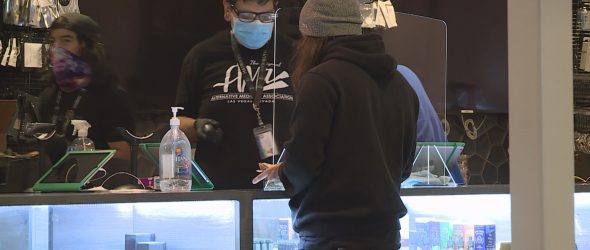RENO, Nev. (KOLO) It’s been eight years since states began to legalize recreational marijuana, but the enormous industry is still cash-based. Nevada Attorney General Aaron Ford and many others are aiming to change that with the SAFE Banking Act.

The Secure and Fair Enforcement Banking Act would put cannabis-related businesses into the federal banking system, allowing them to be regulated more closely and also receive federal assistance and resources. In May of 2019, AG Ford was part of a similar push to pass the SAFE Banking Act, only to see it advance thru the House and die in the Senate.
“As one of the states that has legalized the use of marijuana, this legislation would help law enforcement, tax agencies and regulators monitor local marijuana businesses and transactions,” said AG Ford. “I’m proud to redouble my efforts with Congress to pass this important legislation.”
Ford, along with 33 other attorney generals from states (and Guam) with legalized marijuana, sent a letter to congressional leaders urging the passing of the SAFE Banking Act. It’s passed the House again, as part of the recent HEROES Act Relief legislation.
The letter, which can be seen here, says bringing the ever-growing marijuana industry into the federal banking system “reflects a recognition of the realities on the ground and an embrace of our federalist system of government that is flexible enough to accommodate divergent state approaches.”
Christine Gamez, general manager at Blum dispensary in Reno, thinks this significant shift is long overdue.
“A lack of education is probably the easiest, nicest way to say it, said Gamez. “There’s a lot of people afraid of a plant.”
The Coronavirus pandemic has only heightened worries about the dispensary’s cash flow. No matter the amount of cleaning efforts, physical money presents a problem.
“We can’t control what comes into our store and what we give back as change,” said Gamez, also citing the danger associated in having to pay the business’ large bills and taxes with cash.
“Tens of thousands of dollars,” said Gamez. “It puts a target on us.”
Gamez, along with myriad others in the marijuana business, are hoping change is on the horizon.
“Not everybody has funds available right now when they need their medicine,” said Gamez. “If they needed to charge a credit card, that’d give them access until they could make their payment.”
“You can get a glass of wine and be responsible. We should be able to get our medicine and be responsible.”
Eight years in, with over half the country having legalized marijuana, Gamez feels the movement will only grow in the right direction.
“I think the energy behind the people is definitely shifting, said Gamez. “When we better as an industry, we better for our community.”
“That’s something that can’t be argued, across the board.”
Copyright KOLO-TV 2020


